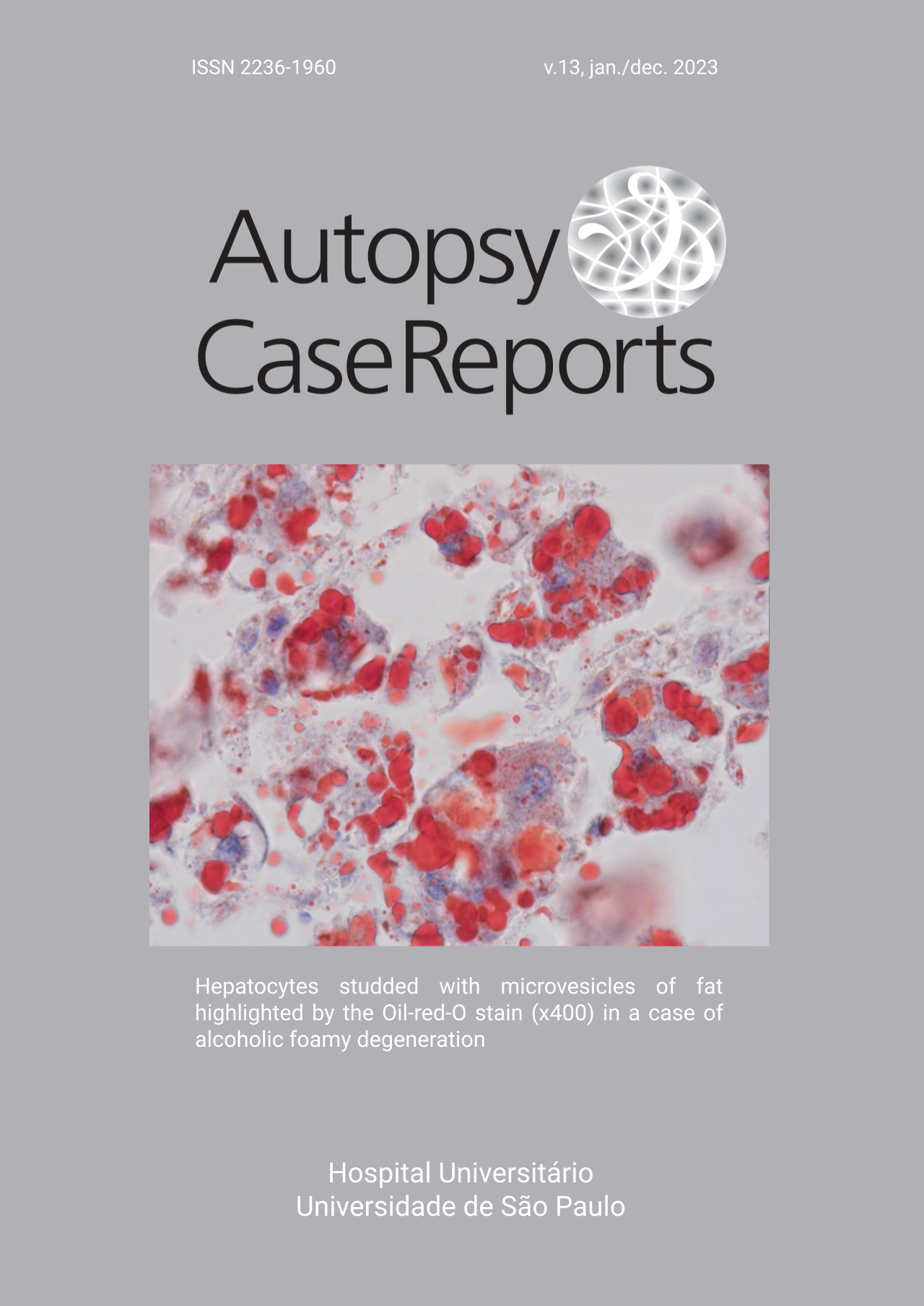Non-insulinoma pancreatogenous hypoglycemia syndrome (NIPHS)/Nesidioblastosis as the underlying cause of recurrent hypoglycemia in a diabetic adult
DOI:
https://doi.org/10.4322/acr.2023.451Keywords:
Nesidioblastosis, Hyperinsulinism, Hypoglycemia, Pancreatic Diseases, Nutritional and Metabolic DiseasesAbstract
Non-insulinoma pancreatogenous hypoglycemia syndrome (NIPHS), without previous bariatric surgery, is a rare form of hypoglycemia in adult patients and is associated with nesidioblastosis. Adult-onset nesidioblastosis in diabetic patients is rare and histologically identical to "non-insulinoma pancreatogenous hypoglycemia syndrome (NIPHS)". Nesidioblastosis is rare in adults and clinically and biochemically mimics Insulinoma. In the literature, there have only been four cases of adult nesidioblastosis that followed diabetes mellitus. We report a case of nesidioblastosis in a 36-year-old diabetic female presenting with dizziness, sweating, and palpitations for three years. Selective non-invasive techniques failed to detect a tumor. Based on the pursuit of an insulinoma, a distal pancreatectomy specimen was received at our laboratory, and a diagnosis of nesidioblastosis was made. She is currently on follow-up with a favorable outcome. The definitive diagnosis of nesidioblastosis is made on a histological basis. The preferred form of treatment is pancreatic surgical resection. Nesidioblastosis should be taken into consideration in cases where diabetes transforms into hyperinsulinemic hypoglycemia.
Downloads
References
Ferrario C, Stoll D, Boubaker A, Matter M, Yan P, Puder JJ. Diffuse nesidioblastosis with hypoglycemia mimicking an insulinoma: a case report. J Med Case Reports. 2012;6(1):332. http://dx.doi.org/10.1186/1752-1947-6-332. PMid:23031644.
Yakovac WC, Baker L, Hummeler K. Beta cell nesidioblastosis in idiopathic hypoglycemia of infancy. J Pediatr. 1971;79:226-31. http://dx.doi.org/10.1016/s0022-3476(71)80105-1. PMID: 4104455.
Kon YC, Loh KC, Chew SP, et al. Hypoglycaemia from islet cell hyperplasia and nesidioblastosis in a patient with type 2 diabetes mellitus-a case report. Ann Acad Med Singap. 2000;29(5):682-7. PMid:11126710.
Dong AM, Yuan ZF, Zhang H, Gao YM, Guo XH. Nesidioblastosis in an adult with type 2 diabetes mellitus: a case report. Beijing Da Xue Xue Bao. 2009;41(5):590-2. PMid:19829681.
Dieterle MP, Husari A, Prozmann SN, Wiethoff H, Stenzinger A, Röhrich M et al. An uncommon cause of recurrent presyncope, dizziness, and tachycardia: a case report of diffuse, adult-onset nesidioblastosis/non-insulinoma pancreatogenous hypoglycemia syndrome (NIPHS). Biomedicines. 2023:11(6):1741. https://doi.org/10.3390/biomedicines11061741.
Bell DS, Grizzle WE, Dunlap NE. Nesidioblastosis causing reversal of insulin-dependent diabetes and development of hyperinsulinemic hypoglycemia. Diabetes Care. 1995;18(10):1379-80. http://dx.doi.org/10.2337/diacare.18.10.1379. PMid:8721942.
Hercus JC, Pasha P, Al Lawati S, et al. Functional localization of adult-onset idiopathic nesidioblastosis. Case Rep Endocrinol. 2022;2022:2802975. PMid:36248221.
García-Santos EP, del Carmen Manzanares-Campillo M, Padilla-Valverde D, et al. A case of hyperplasia of the islets of Langerhans in the adult. Pancreatology. 2013;13(5):544-8. http://dx.doi.org/10.1016/j.pan.2013.06.009. PMid:24075522.
Demartin S, Goffette P, Christ E, Freitag MT, Maiter D, Maria Furnica R. Adult-onset nesidioblastosis: a challenging diagnosis revealed by glucagon-like-peptide-1 receptor imaging. Endocrinol Diabetes Metab Case Rep. 2022:2022:22-0325. http://dx.doi.org/10.1530/EDM-22-0325. PMID: 36448840.
Choi JE, Noh SJ, Sung JJ, Moon WS. Nesidioblastosis and pancreatic non-functioning islet cell tumor in an adult with type 2 diabetes mellitus. Korean J Pathol. 2013;47(5):489-91. http://dx.doi.org/10.4132/KoreanJPathol.2013.47.5.489. PMid:24255640.
Witteles RM, Straus FH 2nd, Sugg SL, Koka MR, Costa EA, Kaplan EL. Adult-onset nesidioblastosis causing hypoglycemia: an important clinical entity and continuing treatment dilemma. Arch Surg. 2001;136(6):656-63. http://dx.doi.org/10.1001/archsurg.136.6.656. PMid:11387003.
Anlauf M, Wieben D, Perren A, et al. Persistent hyperinsulinemic hypoglycemia in 15 adults with diffuse nesidioblastosis: diagnostic criteria, incidence, and characterization of beta-cell changes. Am J Surg Pathol. 2005;29(4):524-33. http://dx.doi.org/10.1097/01.pas.0000151617.14598.ae. PMid:15767809.
Kaczirek K, Niederle B. Nesidioblastosis: an old term and a new understanding. World J Surg. 2004;28(12):1227-30. http://dx.doi.org/10.1007/s00268-004-7598-7. PMid:15517495.
Raffel A, Krausch MM, Anlauf M, et al. Diffuse nesidioblastosis as a cause of hyperinsulinemic hypoglycemia in adults: a diagnostic and therapeutic challenge. Surgery. 2007;141(2):179-84, discussion 185-6. http://dx.doi.org/10.1016/j.surg.2006.04.015. PMid:17263973.
Jabri AL, Bayard C. Nesidioblastosis associated with hyperinsulinemic hypoglycemia in adults: review of the literature. Eur J Intern Med. 2004;15(7):407-10. http://dx.doi.org/10.1016/j.ejim.2004.06.012. PMid:15581742.
Klöppel G, Anlauf M, Raffel A, Perren A, Knoefel WT. Adult diffuse nesidioblastosis: genetically or environmentally induced? Hum Pathol. 2008;39(1):3-8. http://dx.doi.org/10.1016/j.humpath.2007.09.010. PMid:18070631.
Erickson LA, Service FJ, Vella A, Thompson GB, Grant CS, Lloyd RV. Hyperinsulinemic hypoglycemia with nesidioblastosis: histologic features and growth factor expression. Mod Pathol. 2009;22(2):239-45. http://dx.doi.org/10.1038/modpathol.2008.169. PMid:18931647.
Doi S, Yamada T, Kito Y, Obara S, Fujii Y, Nishimura T et al. Adult-onset focal nesidioblastosis with nodular formation mimicking insulinoma. J Endocr Soc. 2021:6(1):bvab185. http://dx.doi.org/10.1210/jendso/bvab185. PMID: 35024540.
Downloads
Published
Issue
Section
License
Copyright (c) 2023 Autopsy and Case Reports

This work is licensed under a Creative Commons Attribution 4.0 International License.
Copyright
Authors of articles published by Autopsy and Case Report retain the copyright of their work without restrictions, licensing it under the Creative Commons Attribution License - CC-BY, which allows articles to be re-used and re-distributed without restriction, as long as the original work is correctly cited.



